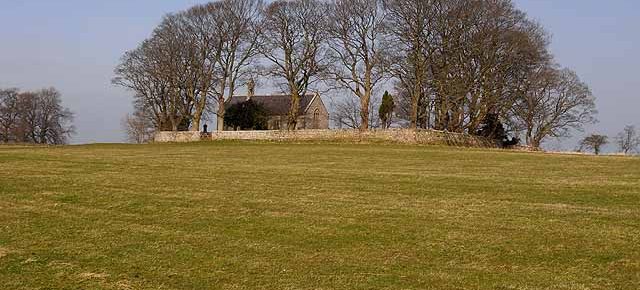Oswald was a member of the Irthing family – there’s still a village just east of Carlisle called Irthington. He was born around 604, the son of the Northumbrian King Aethelfrith. A victim of political change, Oswald spent his childhood in exile on the Island of Iona where he heard about Christianity and became a Christian.
Eventually Oswald and his family returned to Northumbria. Determined to regain his kingdom, Oswald assembled an army at Heavenfield near Hexham, where he erected a wooden cross, gathered his army around it, and prayed for victory. Despite being heavily outnumbered Oswald won the day and regained his kingdom. There is a most beautiful church at Heavenfield, standing in the middle of a field full of wildflowers. If you ever have chance to go, please do – it’s easy enough to get there and back in a day by car.
Oswald’s next task was to convert his subjects to Christianity. St Aidan was put in charge of this task but Oswald had to translate his sermons as Aidan only spoke Irish – the two went around Oswald’s Kingdom together, preaching and teaching and a great many people turned to Christianity. Aidan became the Bishop of Lindisfarne. Aidan and Oswald’s mission was part of a great flowering of Christianity in 7th Century Northumbria – their work was continued by Cuthbert, Wilfrid, Edwin, Hilda and Benedict Bishop. This is the age of the beautiful Lindisfarne Gospels and many beautiful carved stone crosses which are still part of the landscape even today.
What strikes me about Oswald is that he took the message out into his Kingdom, at some considerable inconvenience to himself, I imagine. It would have been much easier for him to summon people to himself, or just wait for people to come. But that’s not what he did – he went out of his comfortable palace and, along with his friend Aidan, put himself out and about in his Kingdom.
I think this has great relevance to us. We tend to sit here, on Sunday mornings, lamenting our increasingly empty church, sometimes castigating people for not being here. Maybe we could learn from Oswald and think about how we can take our faith out of these safe walls, into our parish, following literally in the footsteps of St Oswald who walked here before us.
Taking the gospel ‘out there’ might have some pitfalls. I don’t think we would want to become a nuisance as the Jehovah’s WItnesses and Mormons sometimes are – although I have to admire them for their persistence. Our PCC spends alternate meetings thinking about mission and outreach – perhaps we need to spend some time thinking about how to be ‘out there’. If you have any suggestions please let any of the PCC know. A church in Accrington, for instance, spent a year going around the parish street by street, letting people know that their street was being prayed for that week and asking for any prayer requests. They had many doors shut in their faces, but they also met people who were delighted to be prayed for, some desperately so.
The other great lesson from Oswald is the time he spent translating Aidan’s words into the local language. Although most people speak English in this parish – although that is slowly becoming something we cannot take for granted – the language of our services, our liturgies and hymns, is slowly but surely departing from the language on our streets. What do we mean by confessing our sins? What’s that hymn about which begins ‘On Jordan’s bank the Baptist’s Cry’? Is there are branch of Jordans’ bank in Blackburn? Who are the Baptists? Why are they crying?Just this morning – why is the name of Jesus sweet? Why are we singing about a rock? Why are we even singing at all? When Mackenzie died last year, someone asked about our banner ‘Suffer the Little children to come to me’. Why does God want to make children suffer. Why do we have sheep on some of our altar frontals and why do we call Jesus a Lamb – wasn’t he a human being?
You see, we need to translate. We do something like this translation in our monthly all age services, but I think we need to do more. This is something else the PCC is talking about, possibly with some simple services in the hall on
Sunday afternoons. Have you got any ideas about how these might go? Is there anything we can do to make our normal Sunday services more accessible? They need to feed us spiritually, but can we make them more digestible for others?
I think these are two aspects of that great flowering of Christianity in the North of England all those years ago. There’s more to learn, I’m sure – beauty played a part.
The Lindisfarne Gospel book is absolutely stunning – not that ordinary people would have ever got to see them. But what about those carved crosses? Someone took a great deal of time carving them, but they were not ‘protected’ – they were out there, subject to the elements, vulnerable to vandalism. We might, today, feel that they should be somewhere safe – but these celtic Christians seemed to offer them as gifts to local communities – and, by and large, they’re still there today. There are two in the churchyard at Whalley – ancient crosses telling a tale of people who dared to take the gospel out of church buildings into a sometimes hostile world.
Oswald died before he was 40 – today that would be considered a tragedy. But he had achieved in those, too short years, so very much. May we follow his example, our Patron Saint. Amen

